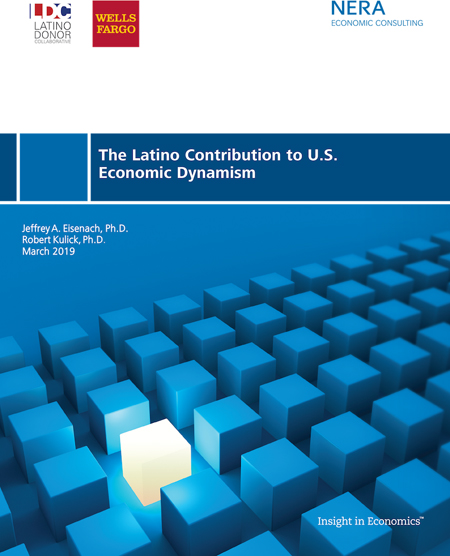SUMMARY: This study examines the effects of growth in the Latino workforce on business dynamism and overall economic performance to further advance our understanding of the Latino effect. The study supports the propositions that growth in Latino employment has a statistically significant and economically material impact on overall economic performance.
INTERESTING POINTS:
- 2/3 of Latinos are in the workforce and 63% are employed.
- Latinos have high entrepreneurship rates, contributing significantly to new business formation and job creation, and are increasingly wealthy, contributing to both consumption and capital formation.
- As a result of Latinos’ high degree of engagement in the economy, Hispanic household income is rising more rapidly than for the rest of the population.
- The higher rate of Hispanic employment growth increases labor productivity by an average of $1,245 per year, increases new business formation by an average of 33,223 firms per year, increases GDP by $4.9 trillion or an average of $701.4 billion per year, and increases GDP per capita by an average of $442 per year from 2019 to 2025.
- Immigration may result in higher rates of new business formation, leading to increases in employment and incomes for all workers.
BUZZ:
DATE OF PUBLICATION: March 2019
AUTHORS: Jeffrey A. Eisenach, Ph.D. (NERA), Robert Kulick, Ph.D. (NERA)
ABOUT THE RESEARCHERS: Dr. Eisenach is a Managing Director and Co-Chair of NERA’s Communications, Media, and Internet Practice. He is also an Adjunct Professor at George Mason University Law School, where he teaches Regulated Industries, and a Visiting Scholar at the American Enterprise Institute, where he focuses on policies affecting the information technology sector, innovation, and entrepreneurship. Previously, Dr. Eisenach served in senior policy positions at the U.S. Federal Trade Commission and the White House Office of Management and Budget, and on the faculties of Harvard University’s Kennedy School of Government and Virginia Polytechnic Institute and State University.
Dr. Kulick is a Senior Consultant at NERA and Adjunct Professor at George Mason University Law School.



